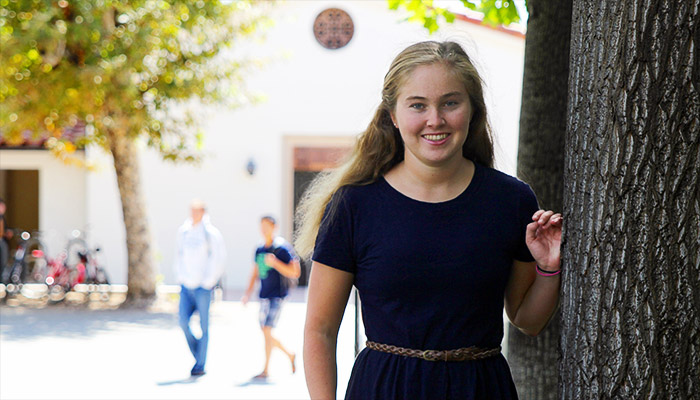
While some undergraduates enter and leave college undecided about their professional callings, Mackenzie Leake ’15 has always had her eye on the prize.
“In the fall, I plan on applying to Ph.D. programs in computer science with a focus on human-computer interaction,” says the physics major from Memphis, Tenn. “Ultimately, I’d like to pursue a research career and teach at the university level.”
Leake is Scripps’ newest recipient of the Barry M. Goldwater Scholarship, the most prestigious undergraduate award given in the sciences. Each year, the merit-based scholarship is awarded to around 300 undergraduate students nationwide intent on pursuing careers in STEM fields – science, technology, engineering, and mathematics.
The award joins Leake with a select number of Scripps students and alumnae granted national fellowships and scholarships in 2014 – ten Fulbright Scholars, one Davis Peace Prize, and one Napier Fellow have already been announced.
The application process for these awards is rigorous. For Leake, it required extensive information about her research background and future goals, including a research proposal that built on the work she had done at Columbia University last summer through the Amgen Scholars program.
Luckily, she had strong advocates in the W.M. Keck Science Department. “Dean David E. Hansen and biology professor John Milton provided invaluable feedback on my research proposal about using a particular machine learning algorithm to categorize neurons,” says Leake.
“Mackenzie, while modest, is an incredibly bright person,” says physics professor Scott Gould. “She is a true leader and a popular teaching assistant because she is very patient and competent. I believe she will be a great professor should she choose that path.”
The summer holds new ventures and possibilities for Leake. Starting in June, she will be working as an intern at IBM’s Almaden Research Center in San Jose, Calif.
“I’m very excited to be working on hierarchical temporal memory (HTM) machine learning algorithms,” says Leake. “Hopefully, the experience will lead to an opportunity to join a research lab working in artificial intelligence and computer interfaces.”

